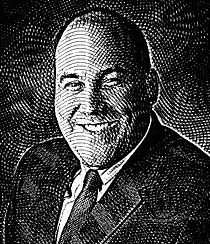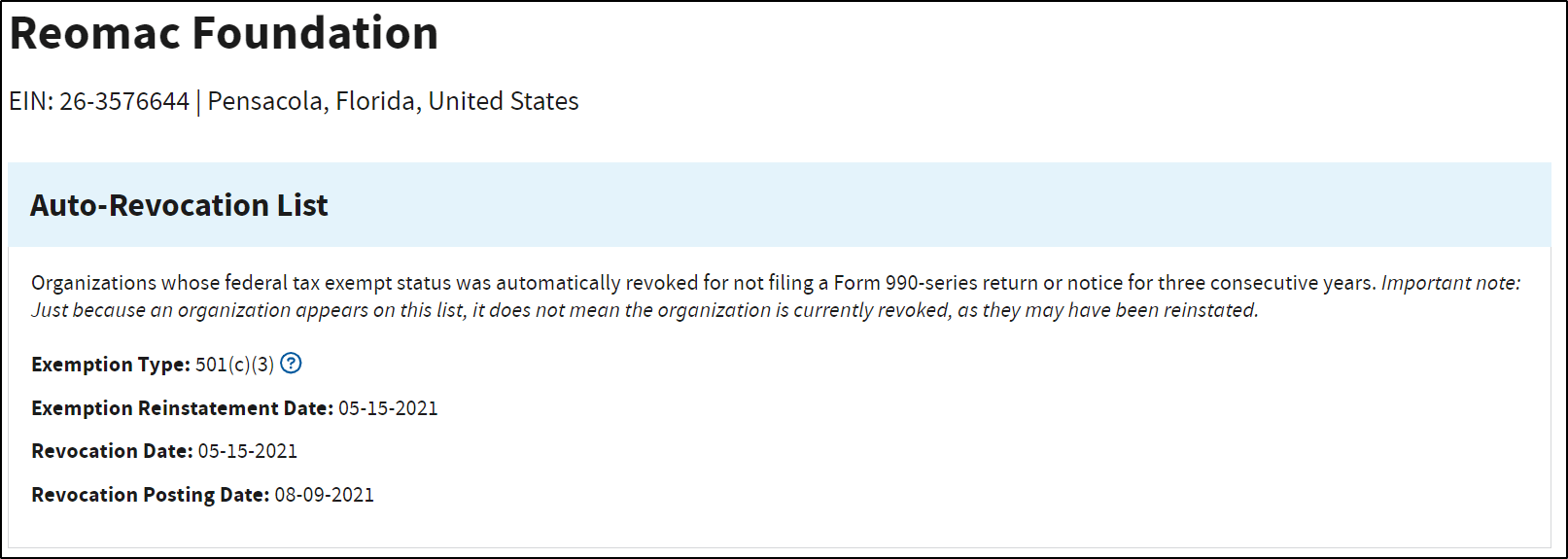In the mortgage field services industry, where euphemism and obfuscation have become tools of survival, few words have been more misused than “rebrand.” What was once a corporate exercise in modernization has become a mechanism for escaping accountability. The National Association of Mortgage Field Services (NAMFS), now experimenting with its new identity as the “National Asset Management and Field Services,”— legally the National Association of Asset Management and Field Services—is simply the latest actor in a long-running drama of retreat. But before NAMFS took its first awkward steps toward reinvention, another organization blazed the trail: the National Association of Default Professionals (NADP), formerly REOMAC. And like NAMFS, NADP’s own transformation looks less like progress and more like an exercise in burying the evidence.
The origins of NADP’s troubles can be traced to the collapse of the REOMAC Foundation, its nominal charitable arm. According to official IRS records, the REOMAC Foundation’s 501(c)(3) tax-exempt status was automatically revoked on May 15, 2021, for failing to file the required Form 990 returns for three consecutive years. It should be noted that NAMFS is in the same boat according to the IRS and their nonprofit search page. The revocation was formally posted by the IRS on August 9, 2021, and to date there is no record of reinstatement. Despite this, NADP continues to feature the defunct REOMAC Foundation on its website, giving the impression of ongoing charitable legitimacy. In a sector where credibility is already thin, the decision to promote a revoked foundation reads as either breathtaking negligence or calculated deception. NADP’s leadership has refused to clarify the matter, reinforcing the perception that its rebrand was as much about rewriting history as redefining purpose. And NAMFS? Well, they still cannot agree on what their name is!
NAMFS, meanwhile, sits on the same slippery slope. The organization’s last publicly filed IRS Form 990 covers Fiscal Year 2023, which—while technically current—arrived after years of public opacity and internal turmoil. Since 2011, Executive Director Eric Miller has presided over a steady unraveling of NAMFS’ finances, credibility, and moral compass—logging an average of a $110,000 annual salary, travel junkets, hotels, and expenses. His salary has routinely exceeded total membership dues, an inversion of nonprofit purpose that would have embarrassed even the most cynical corporate board. While NAMFS remains on the IRS rolls for now, its delayed filings, refusal to release their Form 990 to the American public, and chronic membership fraud, one wonders if they are the same questions that doomed REOMAC’s tax-exempt status. One missed filing cycle, and NAMFS joins its new partner on the auto-revocation list.


The alliance between NADP and NAMFS has been publicly described as a “strategic partnership,” but privately it looks more like a reputational life raft shared by two sinking ships. NAMFS, battered by declining membership and most recently the public relations fallout from the murder of Field Service Technician Michael Dodge II last month, needed a new ally to lend an air of credibility. NADP, still haunted by its foundation’s revocation and internal leadership overlap, needed visibility. Together, the groups found in each other what neither could find alone: a veneer of legitimacy. Yet even the basics of this partnership have been clouded by evasiveness. When asked about the relationship, NADP’s leadership declined to respond years ago. Transparency, in both cases, remains a casualty.
It is not the first time NAMFS has sought to polish its tarnished image through association. Over the years, it has partnered with data analytics behemoth Verisk, whose aggressive consolidation of property preservation software has drawn the attention of Housing and Urban Development (HUD) officials concerned about antitrust violations. A senior HUD official, speaking privately, confirmed that Verisk’s dominance “would certainly help lay the groundwork for an Anti-Trust case.” Despite those warnings, NAMFS ceded its own 2023 conference—mockingly dubbed “#FraudFest” by many—to Verisk’s marketing apparatus. Verisk’s fingerprints were on every panel, every sponsorship, every speech. By the end of the event, it was clear that NAMFS no longer represented the mortgage field services industry; it represented Verisk’s business interests within it.
The parallels between NAMFS and NADP go beyond structure and timing—they extend into ideology. Both organizations frame themselves as advocates for “industry professionals,” yet neither includes Field Service Technicians or Inspectors in that definition. For Technicians—the laborers who secure, clean, and repair foreclosed properties—and for Inspectors, who perform occupancy checks and condition reports, the associations’ rebrands mean nothing. These workers have seen over seventy percent of their ranks vanish in the past decade, according to NAMFS’ own data. The reason is simple: low pay, dangerous conditions, and a total absence of representation. The associations’ leaders, meanwhile, continue to collect salaries and sponsorships while ignoring the blood and sweat underwriting their existence. Moreover though, NAMFS members have received enormous price hikes in virtually every category, including inspections. Not a penny of that has filtered through. Labor’s pay remains stagnant over the past 30+ years.
When Michael Dodge II was murdered while performing a property preservation work order, NAMFS had a moral and institutional obligation to respond. Instead, it remained silent other than an incorrect and hastily worded private email. Its newly titled Unlocked podcast, hosted by Board Member Kellie Chambers—formerly of Mortgage Specialists, Inc., a company notorious for defrauding contractors—released episodes focused on profitability and “vicious animals” while Dodge’s death went unmentioned. It was a moment of chilling symbolism: a trade group obsessed with animals but indifferent to the human lives lost in its own backyard. NADP’s silence about its revoked foundation and its partnership with NAMFS suggests a similar moral void.
The irony is hard to miss. Both associations operate under the banner of professionalism, ethics, and compliance—words that ring hollow in the face of their conduct. NADP’s foundation, revoked for failing to meet the simplest of IRS obligations and NAMFS, whose FY2023 filing barely staves off scrutiny, continues to avoid meaningful engagement with the public or its members—or their required past two years of IRS 990 filings. These are not the actions of organizations committed to integrity. They are the actions of institutions that have learned to survive by rebranding rather than reforming.
This culture of perpetual reinvention is not just a branding problem—it is a structural threat to the industry itself. Many NAMFS members collect the pay owed to Field Service Technicians and Inspectors, steal it, and then rebrand. The involuntary bankruptcy of National Field Network, which eventually cost Shari Nott her life in an auto accident, is a prime example! By hiding behind nonprofit status while operating as trade cartels for management firms, associations like NAMFS and NADP distort the regulatory landscape. They claim to speak for the industry while silencing its labor. They invoke professionalism while enabling the very abuses that have driven Technicians and Inspectors out of the field. Their conferences, webinars, and “partnerships” serve as ritualized performances of legitimacy, not vehicles for reform.
If NADP’s revoked foundation represents one end of the spectrum and NAMFS’ better late than never FY2023 filing and the missing two years of filings the other, then the continuum between them is corruption disguised as continuity. Both organizations are running on fumes—fiscally, legally, and morally. What little credibility they still possess comes not from transparency or leadership, but from inertia. The system has not yet forced them to collapse, so they continue to exist. But make no mistake: they are ghosts, propped up by corporate sponsors and the illusion of nonprofit respectability.
The broader danger, however, extends beyond the walls of these associations. When nonprofits in federally adjacent industries like mortgage servicing flout transparency laws, they erode public trust in the very programs they orbit. HUD, the VA, the GSEs—all rely on trade groups to liaise with industry participants in good faith. Yet what they have instead are self-serving shells that neither protect workers nor uphold compliance. If REOMAC’s revocation is any indication, enforcement is possible. The only question is whether regulators will have the will to look past the rebrands and see the rot beneath.
Until then, the mortgage field services industry will continue its descent into the theater of the absurd—a place where defunct nonprofits run “foundations,” trade associations rename themselves to escape their pasts, and laborers are murdered while their supposed advocates like Kellie Chambers talk about animals on podcasts. Whether NAMFS joins NADP on the IRS revocation list is almost beside the point. Both have already forfeited what no reinstatement can restore: credibility. And for the Field Service Technicians and Inspectors still out there, knocking on doors and risking their lives for pennies, that loss is more than symbolic—it’s existential.











